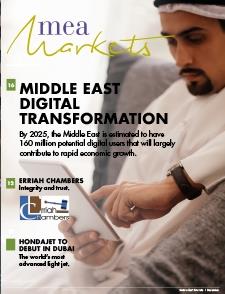
Dubai, United Arab Emirates – Change continues to be the defining feature of the global energy sector in 2017. In the oil and gas industry, as well as in electric power, major internal and external forces are driving change, requiring industry leaders to revisit strategies.
In oil & gas, 2016 was a year of continued overproduction. The resulting oil inventory overhang finally had an effect in reducing U.S. shale production, but did little to spur demand that’s needed to bring the global market into balance.
In the Middle East, a prolonged period of low oil price has impacted government spending but the move toward economic diversification and reduced reliance on oil is prompting greater investment in high-potential sectors including real estate, construction, hospitality, tourism and education. There is also a greater national focus on achieving operational efficiency across sectors ‘ and one notable area that stands to benefit immensely from embracing digitally-enabled solutions is utilities.
The utilities sector has historically under-invested in information technology (IT), but an increasing number of utilities in the Middle East and North Africa (MENA) region are waking up to the benefits of smart technology.
In utilities and electric power, the traditional supply chain is undergoing change driven primarily by regulation, public policy, plentiful inexpensive natural gas, and dramatic cost declines in renewable energy and storage.
Dr Walid Fayad, executive vice president at Booz Allen Hamilton MENA said: ‘Energy and technology form the backbone of global economies and play a crucial role in driving the operational success of all other sectors. As innovation and technological disruption become the norm across the MENA region, we are increasingly seeing regulators and policy makers embracing game-changing trends in the energy sector ‘ from support of renewable energy, advanced metering, and grid modernization to big data and cloud. We expect that wider adoption of these technologies will increase overall operational efficiencies, especially in the wake of a period of prolonged low oil prices.’
Dr. Adham Sleiman, vice president, Booz Allen Hamilton MENA, adds: ‘Data analytics has emerged as one of the key trends that will shape the future of the energy sector in 2017. Big data is rapidly changing the way the energy sector operates globally ‘ by reducing costs, optimizing investments and reducing overall risk. In order to achieve these objectives, and create additional value from untapped areas, organizations in the Middle East must establish holistic digital strategies that include upgrading their required digital capabilities.
Booz Allen Hamilton identified the following 5 trends that will impact the energy industry in 2017:
1. Focusing on Capital Expenditure Productivity
Market shifts are putting capital program execution under major pressure in both the oil and gas and electric power industries. In oil and gas, the global ‘lower for longer’ cycle of oil prices has executives and boards of Integrated Oil Companies, National Oil Companies, and oilfield service providers placing high scrutiny on exploration and production activities. Industry leaders are pursuing everything from technology and information innovation, to greater personnel and asset tracking in oilfield development in an effort to drive greater labor and material productivity. In the electric power industry, inexpensive natural gas has already caused a collapse in the construction of new coal plants, and nuclear power is now in danger of a similar decline. Across the entire energy spectrum, companies are taking steps to develop the capability to conduct deep continuous analysis of their capital projects during execution, and leaders are finding ways to put the insights they gain into management action.
2. Creating Enterprise Value from Data
Like many industries, the energy sector has seen the amount of data from its operations skyrocket as advanced instrumentation and metering has been implemented. Only the most accessible benefits from this data have been realized so far, mainly focused on identifying opportunities for cost savings through labor elimination and incremental improvements to existing processes. While analytics in the industry is nothing new, companies are only starting to scratch the surface of how data can create new value within existing businesses. For example, vertically integrated oil majors have weathered the ‘lower for longer’ market environment in recent years better than non-integrated competitors because of their refining and petrochemical businesses. Yet most of these companies have very limited insight into the markets into which they sell their products. Data science is changing this, creating dramatically better ability to decipher and understand trends, draw insights, and capture new opportunities. A similar change is underway in safety and reliability, where use of data is changing what engineers know about the optimal safe operating envelope for industrial processes. Organizationally, companies across the energy spectrum are growing centralized data science teams, often blending legacy employees with new, more data science-oriented hires. The hard work of building business cases for data science is just beginning.
3. Using Markets to Shape the Future Grid
Public sector support of renewable energy, advanced metering, and grid modernization over the past five years ‘ in the form of mandatory deployment standards, and direct and indirect subsidies ‘ have been very effective at driving down the costs of these advanced energy technologies, spurring their broader deployment. As regulators and policy makers consider what comes next, they are increasingly moving from a standards-and-subsidy approach to one that is more market-driven. As a foundation for future markets, regulators are requiring a greater understanding of the value that distributed energy resources (DERs) bring to the grid, so owners of DERs can be fairly compensated. For utilities, particularly in retail markets, this means understanding how the grid works in greater detail, and being able to dynamically model how it changes over time with the further expansion of DERs. Ultimately, it also means operating markets where customers have greater choice than ever before.
4. Following Security to the Operational Edge
Across the energy sector, security has been focused primarily on protecting company and customer data on corporate systems. With the increase in instrumentation, automation, and virtualization of operational assets ‘ the rise of the Internet of Things ‘ the security frontier is moving to the operational edge, and is growing in importance. We have already seen the growing threat to Industrial Control Systems (ICS) because they represent an increasingly diverse and extensively connected set of technologies. ICS are already automating power movement through the electrical grid, oil flow through pipelines, and control of manufacturing systems. Unfortunately, as cyber attackers are more emboldened, they are recognizing the operational, economic, and safety impacts that attacks on ICS infrastructure can cause. As a result, companies will increase focus on security beyond their traditional lens.
5. Innovation is the Tipping Point for Cloud
In most industries, the decision to migrate IT infrastructure from fixed, on-premises servers to cloud-enabled as-a-service models has been heavily based on cost. This was true for many corporate systems at the oil supermajors, but it’s innovation that’s driving the current wave of cloud migration in the operational business units at these companies. The rise of analytics within operational business units in order to create maximum business value is enabled by a digital strategy centered on the flexibility that the cloud provides. In the utility industry, movement to the cloud has been delayed by ambiguity over how the costs of new service models are categorized.
























